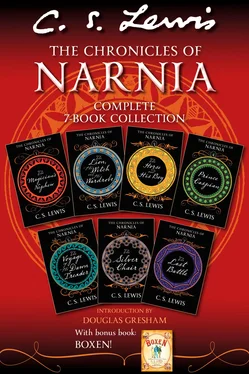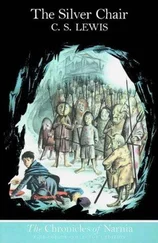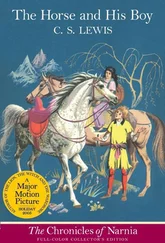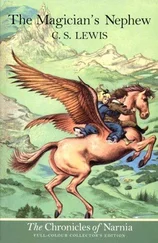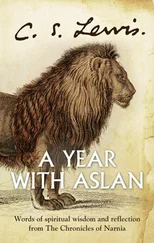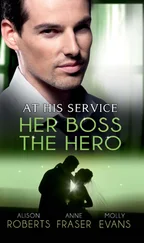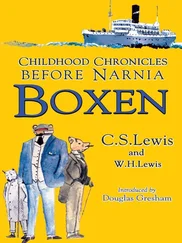Chapter Three: The Lone Islands
Chapter Four: What Caspian Did There
Chapter Five: The Storm and What Came of It
Chapter Six: The Adventures of Eustace
Chapter Seven: How the Adventure Ended
Chapter Eight: Two Narrow Escapes
Chapter Nine: The Island of the Voices
Chapter Ten: The Magician’s Book
Chapter Eleven: The Dufflepuds Made Happy
Chapter Twelve: The Dark Island
Chapter Thirteen: The Three Sleepers
Chapter Fourteen: The Beginning of the End of the World
Chapter Fifteen: The Wonders of the Last Sea
Chapter Sixteen: The Very End of the World
The Silver Chair
Dedication
Chapter One: Behind the Gym
Chapter Two: Jill Is Given a Task
Chapter Three: The Sailing of the King
Chapter Four: A Parliament of Owls
Chapter Five: Puddleglum
Chapter Six: The Wild Waste Lands of the North
Chapter Seven: The Hill of the Strange Trenches
Chapter Eight: The House of Harfang
Chapter Nine: How They Discovered Something Worth Knowing
Chapter Ten: Travels Without the Sun
Chapter Eleven: In the Dark Castle
Chapter Twelve: The Queen of Underland
Chapter Thirteen: Underland Without the Queen
Chapter Fourteen: The Bottom of the World
Chapter Fifteen: The Disappearance of Jill
Chapter Sixteen: The Healing of Harms
The Last Battle
Chapter One: By Caldron Pool
Chapter Two: The Rashness of the King
Chapter Three: The Ape in Its Glory
Chapter Four: What Happened That Night
Chapter Five: How Help Came to the King
Chapter Six: A Good Night’s Work
Chapter Seven: Mainly About Dwarfs
Chapter Eight: What News the Eagle Brought
Chapter Nine: The Great Meeting on Stable Hill
Chapter Ten: Who Will Go Into the Stable?
Chapter Eleven: The Pace Quickens
Chapter Twelve: Through the Stable Door
Chapter Thirteen: How the Dwarfs Refused to Be Taken In
Chapter Fourteen: Night Falls on Narnia
Chapter Fifteen: Further Up and Further In
Chapter Sixteen: Farewell to Shadowlands
Boxen
Introduction
Animal-Land
The King’s Ring
Manx Against Manx
The Relief of Murry
History of Mouse-Land from Stone-Age to Bublish I (Old History)
History of Animal-Land (New History)
The Chess Monograph
The Geography of Animal-Land
Boxen
Boxen: or Scenes from Boxonian City Life
The Locked Door and Than-Kyu
The Sailor
Littera Scripta Manet
Tararo
The Life of Lord John Big of Bigham
Encyclopedia Boxoniana
The History of Boxen
Keep Reading
About the Author
About the Publisher
Introduction
A Conversation with Douglas Gresham
All their life in this world and all their adventures in Narnia had only been the cover and the title page: now at last they were beginning Chapter One of the Great Story which no one on earth has read: which goes on forever: in which every chapter is better than the one before.
—The Last Battle
On November 22, 1963, C. S. Lewis began the Great Story, and his fans around the world lost their beloved author. In honor of the 50th anniversary of his passing, you are invited to join in on an exclusive conversation with Douglas Gresham, Lewis’s stepson, who lived with him at his home, The Kilns, from the age of ten.
Mr. Gresham remembers his stepfather, Jack, telling stories about how as boys, he and his brother, Warnie, crossed the Irish Sea from Belfast on a steamer to get to boarding school in England. Though Warnie suffered terrible seasickness, Jack delighted in the voyages and would dash about the ship with great enthusiasm. He loved the sights, sounds, smells, and liveliness of the sea, which he vividly depicted in The Voyage of the Dawn Treader. Mr. Gresham also recalls Jack’s famous friendship with J. R. R. Tolkien (Tollers, to Jack), a bond that grew from shared values in literature and ultimately encouraged the men to write The Chronicles of Narnia and The Lord of the Rings and The Hobbit, respectively, works now included in the canon of classic literature. Mr. Gresham continues to see the legacy of Narnia carried on worldwide and more intimately within his own family—his tenth grand-child is called Caspian, a name that, to him, stands for something far-off and adventurous, a touch magical and wondrous.
On this momentous occasion, Mr. Gresham graciously shares these and other personal memories of growing up with the author of Narnia while he was still writing the series, and pays tribute to the lasting impression C. S. Lewis made on generations of readers.
1. You told us that C. S. Lewis always said that if a book was worth reading when you are five, it should be equally worth reading when you are fifty, or any age at all. How do you think people react to The Chronicles of Narnia as children, and how is that different when reading the books as adults?
Children have the ability to more easily project themselves into the fantasy, and unless they savour and practice this skill, it tends to fade as life and the world get in the way. Grown-up people who do not have this skill must relearn it to become a part of Narnia in the way that children do. Also, young children have often not yet been indoctrinated regarding what is real and what is not and what can happen and what is impossible; thus they can accept fantasy far more readily than adults can instead of somehow validating it by calling it “news” or “reality.” Children have a far better and undimmed sense of truth than adults.
2. Why did your stepfather set out to write a children’s book? Did he talk about the process and if it was different from writing an adult book?
I think it all goes back to a conversation, or series of conversations, between my stepfather and Tolkien, and possibly others as well. They seem to have talked about the children’s literature of the late 1940s and early 1950s with dismay, finding nothing that they would have enjoyed as children or even could enjoy as adults. The literature that children were being expected to read and enjoy at that time seemed to teach them things that sensible parents would rather their children did not learn—all about “issues” and “complexes” and such. High Adventure, Chivalry, Personal Responsibility, Personal Commitment, Duty, Honor, Courtesy, and Honesty all seemed to have been dismissed as out of date or passé. Jack and Tolkien both agreed that such qualities and virtues were essential to human civilization and decided that they themselves had better have a try at writing about them. So they did.
3. From what literary influences did C. S. Lewis draw his inspiration for Narnia? What types of mythology and literature have been blended to form the world and the creatures of that land?
Jack drew from the huge wealth of knowledge he had gleaned over many years by his own voracious reading. He drew from all the ancient mythologies of the world: Greece, Rome; he also borrowed from Scandinavian mythology, Persian, and Egyptian—even from the history of the ancient East. His Calormen civilization, for example, comes from the ages-past Moghul Empire of India, while his Narnian Dwarfs came from the far North of Europe. He also drew his characters from people whom he knew. Puddleglum the Marsh-wiggle, a member of Jack’s only completely original species, the Marsh-wiggles of the Shribble Marshes, was drawn from the wonderful character of Frederick Calcutt Paxford, our gardener at The Kilns, our home in Oxfordshire.
4. Were you ever in the same room with C. S. Lewis while he was writing? What was that like? Did he ever discuss or share how his writing went that day?
Several times, but I was always careful not to be an intrusive or distractive presence. I had been raised by writers and knew very well that to sit silently reading was acceptable; to fidget and talk or otherwise intrude was not. Jack was very forgiving though. But as a normal everyday thing, Jack would retire to his upstairs study or down to Warnie’s study to write; only occasionally did he sit at the old desk in the bay window of the Common Room, as we called our sitting room and where I was likely to be, to write. I would occasionally ask him what he had been working on, and he would tell me in some detail or even read a passage to me if he thought the matter would interest me. We had a household word for arrant nonsense, which was “bilge”; and if Jack was working on something deep and complex, some academic essay or something that he knew I would neither enjoy nor understand, he would laugh and say self-deprecatingly, “Oh just bilge, Doug, just bilge,” and we would both laugh, for I knew all too well that what he referred to as “just bilge” was likely to be work of great value to the world and the people of it.
Читать дальше
